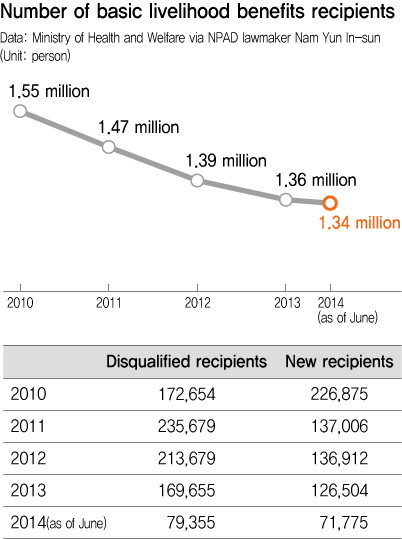hankyoreh
Links to other country sites 다른 나라 사이트 링크
More people being pushed out of basic livelihood benefits program

By Choi Sung-jin, staff reporter
Over the past five years, the number of people receiving basic livelihood benefits has decreased by around 220,000, documents show. Since the administration of former president Lee Myung-bak (2008-2013), the focus of welfare policy has shifted from identifying the poor and providing them assistance to blocking fraudulent attempts to get government aid. This is prompting concerns that the blind spots in the welfare system are actually getting bigger.
According to a document from the Ministry of Health and Welfare showing changes in recipients of basic livelihood benefits released on Sept. 1 by Nam Yun In-sun, a lawmaker with the New Politics Alliance for Democracy (NPAD) and a member of the National Assembly’s Health and Welfare Committee, the number of recipients of basic livelihood benefits decreased from 1.57 million in 2009 to 1.34 million in June of this year. As a percentage of the overall population, the number of recipients fell by 0.6 percentage points, from 3.2% in 2009 to 2.6% this year.
[%%IMAGE2%%]When one examines the past 10 years instead, the total number of allowance recipients increased steadily from 1.51 million in 2005 until 2009 and then began to fall in 2010 to 1.55 million. Since then, the number of recipients has decreased by tens of thousands each year.
This past February, a tragic triple suicide of a mother and her two daughters in the Songpa district of Seoul sparked a public outcry about blind spots in the basic livelihood benefits system. Despite this, the number of benefit recipients this past June actually decreased by 7,580 from the same period last year, when there were 1.36 million recipients.
Even though this family was living under the poverty line and found it difficult to support themselves on their own, they were ineligible for welfare support including the basic livelihood benefits. In the end, they committed suicide.
The primary reason that the number of welfare recipients is decreasing each year is because more people are disqualified from receiving benefits than are newly added to the program. In 2013 alone, only 126,504 new people were registered as welfare recipients, while 169,655 people were dropped from the program. As a result, the number of recipients decreased by 43,151 people. In 2014, there have also been more people disqualified (79,355) than newly registered (71,775).
The reasons that 169,655 people were removed from the basic livelihood program in 2013 include an increase in their income or assets (47,437) and the obligation of their children to take care of them (21,971). The government determined that these people were making too much money to qualify for basic livelihood benefits.
“We are told that the number of recipients of basic livelihood benefits has decreased by about 220,000 over the past five years. This number should be seen as signifying not those who have come out of poverty, but simply those who have been deprived of their basic livelihood benefits. If the government means to guarantee poor people welfare benefits including the basic livelihood benefits, it must eliminate the blind spots in the welfare system by relaxing the standards for support by children and by recalculating the minimum cost of living, which at the moment is absurdly low,” said Kim Yun-young, secretary general of Korean People’s Solidarity Against Poverty.
Please direct questions or comments to [english@hani.co.kr]

Editorial・opinion
![[Column] Park Geun-hye déjà vu in Yoon Suk-yeol [Column] Park Geun-hye déjà vu in Yoon Suk-yeol](https://flexible.img.hani.co.kr/flexible/normal/500/300/imgdb/original/2024/0424/651713945113788.jpg) [Column] Park Geun-hye déjà vu in Yoon Suk-yeol
[Column] Park Geun-hye déjà vu in Yoon Suk-yeol![[Editorial] New weight of N. Korea’s nuclear threats makes dialogue all the more urgent [Editorial] New weight of N. Korea’s nuclear threats makes dialogue all the more urgent](https://flexible.img.hani.co.kr/flexible/normal/500/300/imgdb/original/2024/0424/7317139454662664.jpg) [Editorial] New weight of N. Korea’s nuclear threats makes dialogue all the more urgent
[Editorial] New weight of N. Korea’s nuclear threats makes dialogue all the more urgent- [Guest essay] The real reason Korea’s new right wants to dub Rhee a founding father
- [Column] ‘Choson’: Is it time we start referring to N. Korea in its own terms?
- [Editorial] Japan’s rewriting of history with Korea has gone too far
- [Column] The president’s questionable capacity for dialogue
- [Column] Are chaebol firms just pizza pies for families to divvy up as they please?
- [Column] Has Korea, too, crossed the Rubicon on China?
- [Correspondent’s column] In Japan’s alliance with US, echoes of its past alliances with UK
- [Editorial] Does Yoon think the Korean public is wrong?
Most viewed articles
- 1‘We must say no’: Seoul defense chief on Korean, USFK involvement in hypothetical Taiwan crisis
- 2N. Korean delegation’s trip to Iran shows how Pyongyang is leveraging ties with Moscow
- 3Amnesty notes ‘erosion’ of freedom of expression in Korea in annual human rights report
- 4‘Weddingflation’ breaks the bank for Korean couples-to-be
- 5[Reportage] On US campuses, student risk arrest as they call for divestment from Israel
- 6[Column] Park Geun-hye déjà vu in Yoon Suk-yeol
- 7Korea sees more deaths than births for 52nd consecutive month in February
- 8[Editorial] New weight of N. Korea’s nuclear threats makes dialogue all the more urgent
- 9Will NewJeans end up collateral damage in internal feud at K-pop juggernaut Hybe?
- 10[Guest essay] The real reason Korea’s new right wants to dub Rhee a founding father